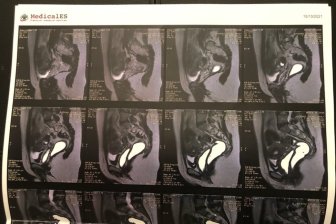Meghan MacDonald thought she was well-prepared for the birth of her first child. She and her husband attended classes, did the research, and were highly anticipating the arrival of their bundle of joy.
But she says when she arrived at Halifax’s IWK Health Centre early one morning in July after her water broke, what was supposed to be an exciting experience turned into a traumatic one.
MacDonald alleges that from the start of her birthing experience, she was met with neglect and a lack of compassion — at one point being left in a room for 13 hours as she suffered from excruciating pain.
Read more:
Endometriosis: Why Canadian women are flocking to a clinic in Bucharest for surgery
Read More
-
![]()
Endometriosis: Why Canadian women are flocking to a clinic in Bucharest for surgery
“If this could happen to someone like me — not that I’m any better than anybody else, but I feel like I was extremely resourceful and prepared — it could happen to anyone, and I’m pretty sure it probably does,” MacDonald told Global News.
Leading up to her daughter’s birth, MacDonald said she had received “absolutely extraordinary” care from the IWK’s perinatal centre, so she expected the same level of care during the birth itself.
“That is what built the foundation of what I was expecting to be my birth experience, and why I was so relaxed and why I was so confident going into this,” she said.
Meghan MacDonald with her daughter, Madilyn.
Alex Cooke/Global News
MacDonald first arrived at the IWK Health Centre with her mother and husband around 4:30 a.m.
She went to an early assessment area, where she was given underwear with a pad and told there was “no space” for her as 22 other babies were being born.
During her wait, she said she was checked by the resident and the doctor on-call. She knew she would have to get an IV later on, and asked if she could have a smaller needle because she has small veins and has previously had difficulty with IVs.
“Her response to that was … ‘I don’t care which size IV you get. I’m going off shift,’” she alleged.
Read more:
Fertility care in Atlantic Canada comes with lengthy travel and wait times
After about four hours, she said she was moved to a room in the early assessment and labour ward. She laid on the bed, still wearing the dress she arrived at the hospital in, and said she was not offered a hospital gown, water, or even an extra blanket or pillow.
“I’m in labour and I’m a first-time mother and I don’t know what to expect,” MacDonald said. “No one even offers to help me go to the washroom or to show me where it is.”
MacDonald said she waited in that room, in pain, for about 13 hours, during which time nobody checked on her. She only got help, she said, after her mother went to find a nurse.
Read more:
Couple fights to add both moms to baby’s birth certificate in N.S.
“The only reason why I received treatment was because my mother advocated for me,” MacDonald said. “I’d hate to think what would happen if she hadn’t been there.”
After her mother found her some help, MacDonald got a shot of morphine and was moved to another room and placed in a tub, where she laboured for another four hours.
‘Begging for someone to pay attention to me’
Prior to going to the hospital, MacDonald had prepared a birth plan — something she was encouraged to do by the staff at the perinatal clinic — but she said that despite offering it to a number of staff members, nobody read it.
The birth plan stated she wanted to have an epidural, which would have reduced some of the pain, after she was three centimetres dilated. At this point, she said she was about five centimetres dilated, but was told the anesthesiologist was busy and could not do the epidural yet.
“All I kept being told was, there’s no space for you. And during this … I see women constantly being wheeled up to the next floor,” MacDonald said.

She said her mother asked why others who arrived after them were able to go up to the next floor, and was told it was because they were scheduled for Cesarean sections.
“Had I known that — and I know the recovery situation for a Cesarean is longer — but I would have signed up for a C-section. I just didn’t know that was available,” MacDonald said.
“So I just, quote unquote, ‘have to wait.’ Well, I can only wait so long because I can’t control how long this child is going to stay inside of me and be born, and I’m also begging for someone to pay attention to me to manage this pain,” she said.
“I mean, I didn’t go into this experience thinking that it was going to be a walk in the park and that it was going to be painless.
“Was it going to be painless? No. Is it manageable pain? Yes. Do we live in a first-world country where the expectation is that if we have pain, and we’re asking to be looked after, and for it to be managed? Yes, that was the expectation.”
MacDonald said she was only able to get care after her mother, Evelyn Smith, advocated for her.
Alex Cooke/Global News
She said that instead of an epidural, she was given gas and air, which she said did “nothing” to stop the pain.
Eventually, she said she was put in a wheelchair, naked with a hospital gown “sort of strewn over me, but not put on me,” and wheeled to the next room, within sight of other families and staff.
“Not that I’m a completely bashful person — I mean, it’s health care, people have seen people naked before — but it was embarrassing,” she said.
When she got to the next room and put on the table, MacDonald said she finally got the epidural — when she was about 10 centimetres dilated.
“I did have some relief, thankfully, but at the time, you could have told me you were cutting my leg off, and I would have said: ‘Just give me the epidural!’” she said.
Read more:
N.S. government proposing leave from work for those who experience ‘end of pregnancy’
The nurse in that room was “wonderful,” said MacDonald, and helped her to practise push. Her daughter arrived soon after.
MacDonald said she hemorrhaged, and commended hospital staff for responding quickly. But afterward, she said she was rushed out of the room.
“I had my baby in my arms. Super happy, blissful. The world is a better place, looking into her little face in her eyes,” she said. “But then I was told I have 45 minutes to get showered and ready to get out.”
MacDonald said she went to yet another room to breastfeed her daughter, but had difficulty getting her to nurse. She rang a bell three times to get help, and it took about an hour for someone to arrive.
She said the nurse told her she was “not doing it right,” which was a painful thing to hear as a first-time mother who had never breastfed before, especially after such a traumatic birth. She later hired a private lactation consultant.
Read more:
Halifax nurse on the grief of having 5 miscarriages, and the mom she is now
MacDonald also said she asked for a new pair of underwear with a pad, but was instead told to wash out the pair she was currently wearing and reuse them.
“I don’t find that acceptable … being told to reuse it after it’s been soiled with amniotic fluid and blood after having a vaginal birth,” she said. “I didn’t know there was a limit on how many you were allowed to have.
“So many things I didn’t know.”
In all, MacDonald said she interacted with about 10 staff members altogether, who had varying levels of professionalism and compassion.
MacDonald’s mother, Evelyn Smith, said when she had her daughter in Ottawa 37 years ago, it was different.
“Health care was different when I gave birth to Meghan. I could choose a birthing room. There was a rocking chair. There was a nurse,” she said.
“And this was like, wow. I had never been to the IWK before. … It was a very big surprise.”
‘I wasn’t prepared to beg’
MacDonald said she’s happy and grateful her daughter is healthy, and is enjoying motherhood so far. But the experience has left her traumatized, and she is now attending therapy to work through her feelings.
It also left her reconsidering having children in the future — at least at the IWK.
“I felt like I was extremely well prepared — or I thought I was,” she said. “I wasn’t prepared to beg.”
In an email, IWK spokesperson Ben Maycock said the hospital “cannot comment on any specific patient’s care but strongly encourage the patient to connect with our Patient Feedback line if they have not already.”
Read more:
Nova Scotia family doctor wait list hits record high at more than 116,000 people
MacDonald said she sent a letter detailing her experience to the IWK, and it’s been forwarded to the head of obstetrics.
Nova Scotia has long been struggling with a nursing shortage, and nurses have said in recent years that they are understaffed and overworked. In a statement, a spokesperson for the Nova Scotia Nurses Union said MacDonald’s experience “warrants further discussion within our organization” and declined to comment further.
As for MacDonald, she said she understands staff are busy and things may have slipped through the cracks, but she is sharing her story to shed light on the situation so other parents don’t have to go through the same thing.
“This really isn’t a witch hunt. I don’t want anyone to get in trouble for this,” she said. “I can only share that this is what happened to me. Please don’t let that happen to anybody else.”
Stay connected with us on social media platform for instant update click here to join our Twitter, & Facebook
We are now on Telegram. Click here to join our channel (@TechiUpdate) and stay updated with the latest Technology headlines.
For all the latest Health & Fitness News Click Here




